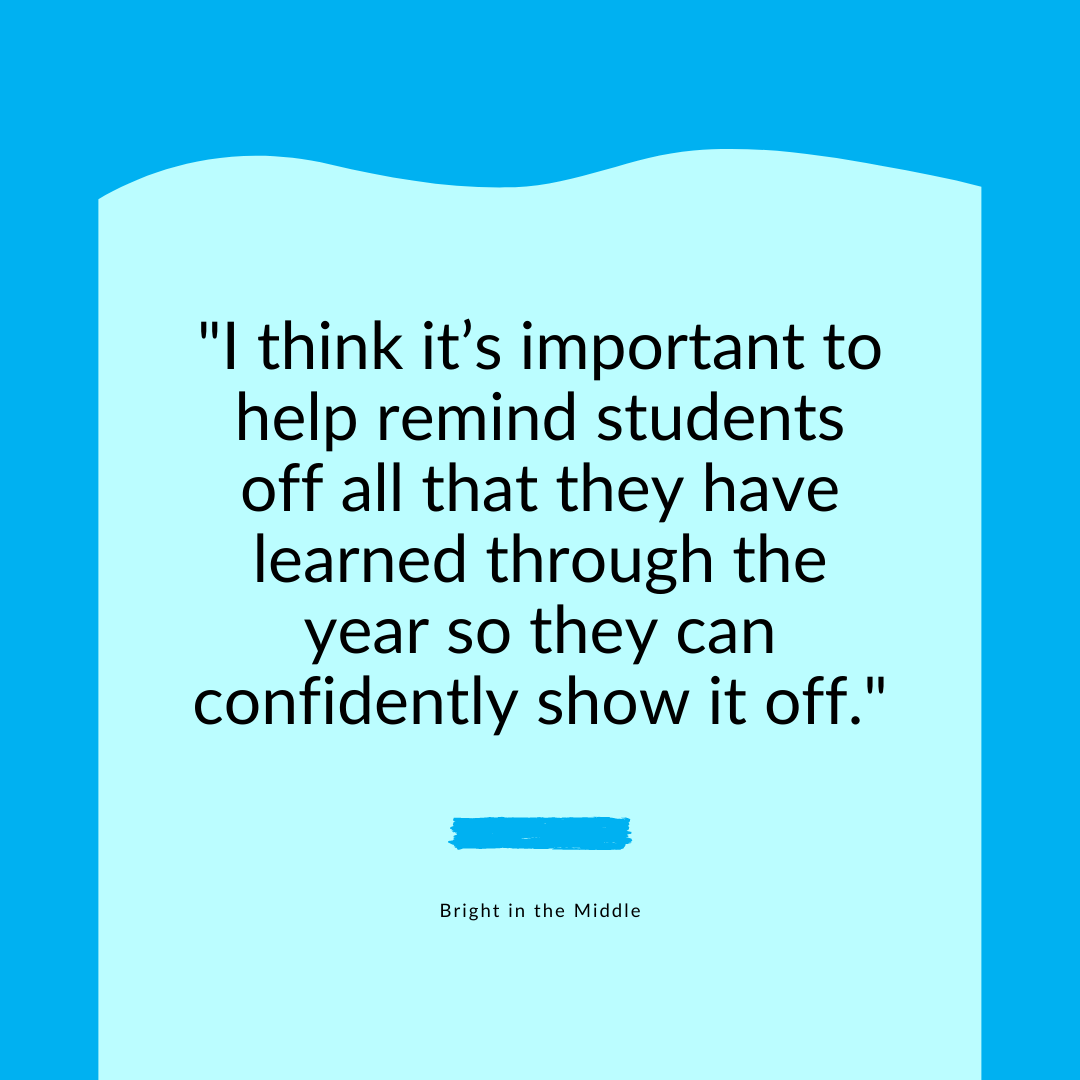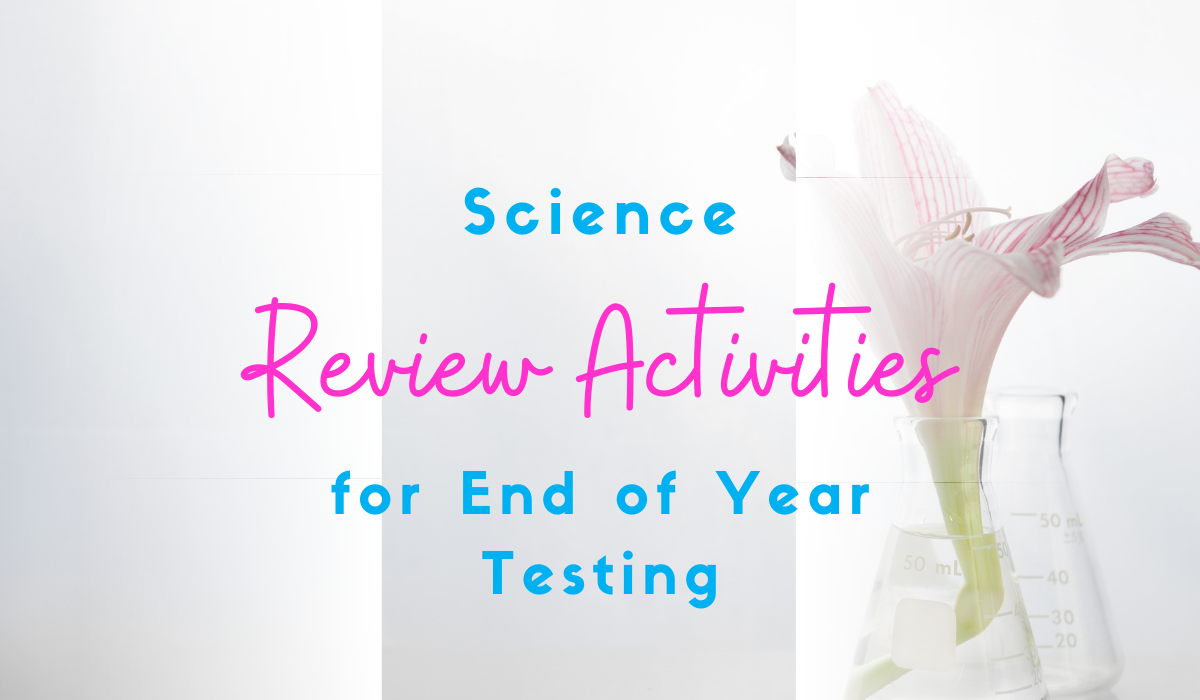It’s almost that time of the year for end of year testing in all subjects, so it’s time to get together a plan and start some science review activities for your students.
I’m not sure about you, but I make sure to leave time before testing, and after teaching all of my content, to review the standards before any end of year testing.
Although, I have my own opinion about all of this testing that is required, I think it’s important to help remind students off all that they have learned through the year so they can confidently show it off!
End of Year Science Testing Review Plan
Before starting any review, you need a plan! Many states provide an idea of what standards will be tested, and how “heavy” that standard will be on the test. The standards that will be tested the most should be reviewed the most.
In addition, it’s important to give your students a pre-assessment before beginning the review. You can use this as a guide to see what your students most need to review.

How to create a science review plan for testing:
- Finish teaching all content early.
- Give students a released science test from your state and analyze the data.
- Determine which standards are tested the most and which standards your students need to review the most.
- Create a calendar and see how many days you’ll have to review.
- Review topics each day, focusing on the ones that your students need the most.
Review Activities to Prepare for the Science Test
After you create your plan and know which standards you need to address the most, it’s now time to start reviewing! Here are some activities that you can use to prepare. You can choose to do one per day, do stations, or whatever works best for your class and how long your classes are.
Test Prep Warm-Ups
Whether you call it a bell ringer, start-up, warm-up, do now, it’s all the same thing. It’s the assignment your students do when they walk in your classroom. Use this time wisely to help students prepare for testing. Start your review day with a warm-up, every day!
After your students complete the released test, you can see which areas the whole class needs more help with.
Use those questions as warm-ups! Warm-ups throughout the year can be pretty random, but during “test-prep” season, focus on giving test-like questions. It will help get students used to the kind of question they will see and give them a confidence boost so the test doesn’t overwhelm them or make them nervous.
You can make up your own or pull from another released test.
Definitely go over the most missed questions from the test they took in class!
Mini-Lessons
Depending on how long your classes are, spend around 5-10 minutes each day giving a mini-lesson about the topic(s) you are reviewing. Hopefully, you have been doing a spiral review throughout the year, but if not, this is a great opportunity to hit the topics that you covered at the beginning of the year, and especially those with harder concepts to grasp.
It doesn’t have to be long. For example, if you are reviewing the layers of the atmosphere, you can just quickly show your class a diagram of the layers and the temperature changes that are associated. Students can visually see the layers and that they separated based on changes in temperatures. You can also discuss how the temperature changes in each layer. Then you are finished!

Task Cards
I love task cards! They are great science review activities. They allow students to get out of their seats and have fun with learning!
There are so many different ways that you can use them to review. Pick your favorite and go with it.
I love them because you can ask students are variety of questions, and different levels, and because they only see one question at a time, it’s not as overwhelming.
Don’t know what task cards are?
Here are some examples:
Unicellular Organisms Task Cards
Distance-Time Graph Task Cards
Earth in the Universe Task Cards
Cut-and-Glue Activities
These science review activities are a good way to mix things up, especially if you don’t implement interactive notebooks in your class.
This is a great hands-on way where students can complete graphic organizers and sorts.
Here are some examples of the type of activities you can use for review:
Speed, Velocity, and Acceleration Cut-n-Glue
Interactive Lessons – As Science Review Activities
You already know that I love interactive lessons! If you have never used them as a lesson in your class, it’s ok, they can be used for science review activities as well!
Interactive lessons are lessons that include interactive activities to help reduce students cognitive load. They are fairly editable in the fact that you can delete slides that you do not need your students to complete or create your own slides.
In addition, you do not have to assign your students the whole lesson. If you just like one or two of the activities included, you can pull those out to assign to students.
There are graphic organizers, drag-and-drop activities, creative story writing, and so much more!
Vocabulary Sorts and Review Games
Vocabulary is HUGE on science tests. I’ve actually heard that if students know the vocabulary, they will be able to pass to test. I do like to make sure they understand the concepts too, but it definitely doesn’t hurt to review the vocabulary as much as you can.
There are so many ways that you can review vocabulary. You can learn more here.
- You can use graphic organizers. You can do this in a notebook, on chart paper, digitally, as a class, individually, and so much more. Be creative!
- You can use word walls. If you don’t have a word wall in your classroom, it’s not too late. They are great just as a visual to refer back to but can also be interactive. Students can use the word wall to create graphic organizers, create a vocabulary notebook, play games, and create anchor charts.
- Word searches are a fun way to expand vocabulary and practice spelling of the vocabulary. I would not use this as a way to solely focus on review vocabulary, but use it as an “I’m finished” activity or make a game of it. For example, as a class, have students search for the term that is “the powerhouse of the cell”.
- There are other games that you can use term review vocabulary. Some examples are Around the World, Wisdom Whispers, Vocabulary Bingo, 60 Second Word List, Charades, and more! You can learn more about these games here.
- Vocabulary sorts are easy to create. Create cards with the term and cards with the definition. Using these, you can have students match the term and the definition.
- Have students to create a song using a number of vocabulary words! This hits the highest level of Bloom’s Taxonomy, and it’s fun!
- Use writing prompts are also a higher level way to review vocabulary and to increase scientific literacy.
There are so many other ways to review vocabulary. So much fun!
Science Videos
Some things just are better explained by a video. A video can help explain some complicated topic in kids language with visuals that are useful. They are also great for demonstrating science labs that may be harder to do in the classroom.
I do have a little “secret” that I use for middle school when I’m searching for a video to watch in class. I’ll type in something such as “physical and chemical changes kids” and those are the videos that I choose from. It helps to weed out some of the content that’s a little tougher. There are some really babyish ones that pop up, of course, but those are easier to weed out due to the very nature of the cover.
As a review assignment, you can use the videos in Edpuzzle. These create wonderful interactive videos for students to apply the information that they are learning.
Add videos to your science review activities!
Jigsaw Review
Just as you use the jigsaw method for teaching a lesson, you can also use it for review. Jigsaw is a method where groups of students learn a chunk of the topic, exploring on their own, and then share it with the class. In this way, the whole class learns everything.
During review, you want to make it short and sweet because you don’t have as much time as you would during the lesson.
Here’s an example of some questions you could ask during a simple machines jigsaw. In this review, you can split your class into 6 groups and give each group simple machine to review.
- What is it?
- How does it make work easier?
- Give a real life example of your simple machine.
- What is a neat fact about your simple machine?
Webquests
Webquests can be a fun way to review a topic. Sometimes, seeing information a second time can help to clarify things. They make great science review activities. There are a lot of resources online where you can find webquest. Students usually have fun with them too. It’s like a scavenger hunt!
Looking for more ideas?
10 Must-Try Science Final Exam Review Ideas for Middle School
Help your students master science content!



[…] Looking for review activities instead? […]